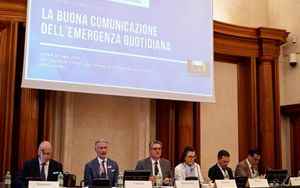(Finance) – The succession of unpredictable emergencies generates a demand for information from which no one is excluded. Communication plays a fundamental role in the representation of reality and professionals in the sector are essential to reduce the risk of fake news. This is the message launched by According to Censis-Ital Communications Annual Report on good communication of daily emergencies. The research – which is born within thePermanent Censis-Ital Communications Observatory on communication and communication agencies – was presented today in the Chapter Hall of the Senate of the Republic.
Emergencies and disinformation: everyone involved – 97.3% of Italians in the last year searched for news on all available sources, off and online. In particular, – the survey notes – 41 million Italians have obtained information on traditional media. In the two-year period 2019-2021, web users increased by 4.2 percentage points and are 83.5% of the population. Millions of people then used social media and instant messaging, themselves becoming protagonists and multipliers of what they read and listened to. More than 7 million Italians have built an information schedule made up of online media, websites and social media only.
Viral fake news and confusing information – A lot of information was accompanied by false news and disinformation: 57.7% of Italians – reads the Report – complain that they have a very or quite confused idea of what is happening in the war between Russia and Ukraine. 83.4% declare that in the last two years they have come across fake news about the pandemic and 66.1% in fake news about the war: the audience of the fakes is huge and their virality exceeds that of the real news. 64.2% of Italians believe that during the emergency spectacularization and the desire to make an audience were privileged rather than information aimed at understanding the problems. Faced with information confusion, 45.5% of Italians turn to informal sources they trust most, but it is in these environments that false news is produced and disseminated through posts, likes and shares. Among the people that Italians trust, even as sources of information, there are influencers: 38.1% follow their opinions and analyzes on the war.
The role of communication agencies – To curb disinformation and fake news, stricter rules must be implemented for platforms and social media, digital education programs and the promotion of quality communication managed by professionals. Emergencies teach that the ability to communicate is essential for managing crises and obtaining a relationship of collaboration and trust between citizens and institutions. There is a need for professionals who lead companies and institutions in communication. Their role is fundamental in combating fake news and disinformation. In 2021, 4,445 communication and public relations agencies are active in Italy, employing 8,290 professionals, for an average of about two employees for each agency.
“With Covid first, then with the war,” he says Massimiliano Valerii, general manager of Censis – web and social networks have fully entered the information ecosystem, and will remain there in the future. Information professionals must take note of this and look for ways to positively influence the web which is and must remain an instrument of freedom and democratization “.
“We must work together, institutions and newspapers, in order to certify the sources and offer the citizen serious and correct information to avoid the spread of ‘fake news’. The public service – he declared Alberto Barachini, president of the Rai Supervisory Commission – should be the main actor considering that he plays a fundamental role. In this sense, the opinion leaders and experts involved in television salons must be prepared and guarantee quality information in order not to generate communication confusion “.
“I thank Censis and Ital Communications – he said Giuseppe Moles, Undersecretary to the Prime Minister with responsibility for publishing and information – for having presented this Report from which very interesting data emerges and which can provide new insights. Information must be defended as it represents a national interest, but it must not be addressed. In this sense, the Government’s commitment is to support the entire supply chain to respond to the challenges of a world that has profoundly changed. Disinformation can only be countered through the collaboration of all the players in the system, starting with families, schools and institutions “.
“The Censis-Ital Communications Report, also in this year’s edition, – underlines Domenico Colotta, founder of Ital Communications – notes that in the information field we are in the presence of a communicative infomedia that generates confusion and anxiety, having the better of correct information. In fact, in recent months, regarding the Russian-Ukrainian conflict, we can talk about war communication and not about war information “.
“In this context – he explains Attilio Lombardi, founder of Ital Communications – communication agencies can certify, using reliable and verified sources, the accuracy of the news they produce and distribute. All this is a guarantee for the functioning of modern democracies, as well as for the protection of people’s dignity ”.
“Freedom of the press is a cardinal principle that also represents the litmus test of democracy. But freedom without responsibility – he said. Andrea Monda, director of the Osservatore Romano – is partial. The Report imposes on us communicators a self-critical reflection. Information now seems to have been disintegrated and entrusted to the arbitration of the individual, therefore it is necessary to question the importance of recovering the role of the community “.
